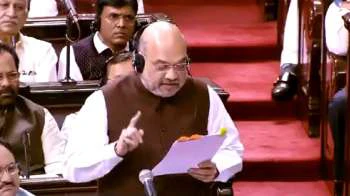Today marks six years since the Narendra Modi-led Indian government abrogated Article 370 in Jammu and Kashmir in a historic move in Indian history that changed the region forever.
The August 5, 2019, decision was presented as a landmark move aimed at bringing peace, promoting development and strengthening the integration of the Kashmir Valley with the rest of India.
In the years since, political activity in Jammu and Kashmir has gradually resumed, including the formation of a new government that is now actively advocating for the restoration of full statehood.
Timeline of events explaining how the Centre paved the way for abrogating Article 370 from the Constitution
June 2018: The BJP ended its coalition government with the PDP in the erstwhile state of Jammu and Kashmir, triggering political instability.
November 2018: Governor’s rule followed by the dissolution of the J&K Legislative Assembly under Governor Satyapal Malik. Following this, President’s Rule was imposed in December 2018 under Article 356; this was later xtended in July 2019.
July 2019: After BJP’s sweeping victory in the 2019 Lok Sabha elections, there was increased troop deployment in Kashmir. Rumours circulated of major constitutional changes in the works.
August 3-4, 2019: Thousands of additional central security personnel deployed. Internet and mobile services suspended across J&K. Section 144 (public assembly restriction) enforced from midnight on August 5. (Maps of India)
August 4-5, 2019: Key political figures including Mehbooba Mufti, Omar Abdullah, and Sajjad Lone were placed under house arrest.
August 5, 2019: The historic bill in Parliament
- Morning: The Union Cabinet met under Prime Minister Narendra Modi. A high-level meeting, including Amit Shah and NSA Ajit Doval chaired the discussion.
- 11:17 AM: Home Minister Amit Shah tabled a resolution in the Rajya Sabha to revoke Article 370 and introduced the Jammu & Kashmir Reorganisation Bill. Following proceedings, both the resolution and the Reorganisation Bill were swiftly passed.
Implementation and bifurcation of J&K
- August 6, 2019: Presidential Order (C.O. 273) came into effect, superseding the 1954 order and nullifying Article 35A. Lok Sabha passed the Reorganisation Bill.
- August 9, 2019: Through the Jammu & Kashmir Reorganisation Act, the state officially split into two Union Territories: J&K (with legislature) and Ladakh (without legislature).
In the aftermath, a stringent lockdown followed: Internet and phone service shutdowns, political detentions, and enforcement of Section 144. Many regions were under tight security.
Supreme Court’s ruling
- August 6-10, 2019: Legal petitions filed, first by advocate M L Sharma and the National Conference, challenging the constitutional validity of the revocation.
- September 2019: The Supreme Court set up a five-judge Constitution bench to hear the cases.
- July 2023 – August 2023: The Supreme Court initiated day-to-day hearings beginning August 2.
- December 11, 2023: The Supreme Court upheld the abrogation of Article 370 and directed the Election Commission to hold assembly elections in J&K by September 30, 2024.
